|
|
|
Sort Order |
|
|
|
Items / Page
|
|
|
|
|
|
|
| Srl | Item |
| 1 |
ID:
189993


|
|
|
|
|
| Summary/Abstract |
Humour is usually overlooked in analyses of international politics, this despite its growing prevalence and circulation in an increasingly mediatised world, with this neglect also evident in the growing literature on ontological security and anxiety in IR. Humour, though, needs to be taken seriously, crossing as it does the high-low politics divide and performing a variety of functions. In the context of the Covid pandemic we argue that the link between humour and anxiety has been evident in three notable respects: (i) functioning as a (sometimes problematic) form of stress relief at the level of everyday practices of anxiety management, (ii) working to reaffirm biographical narratives of (national) community and status and (iii) most significantly for IR, as a form of anxiety geopolitics.
|
|
|
|
|
|
|
|
|
|
|
|
|
|
|
|
| 2 |
ID:
076798
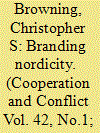

|
|
|
|
|
| Publication |
2007.
|
| Summary/Abstract |
This article introduces the idea of brands to debates about Nordic models and identity. Understanding brands to be more strategic and stable than identities, the article shows how a Nordic brand was marketed during the Cold War, but has since been challenged and undermined by a number of pressures. Central to the Nordic brand have been ideas of Nordic 'exceptionalism'-of the Nordics as being different from or better than the norm-and of the Nordic experience, norms and values as a model to be copied by others. In the post-Cold War period, key aspects of the Nordic brand have been challenged. On the one hand, elements of the Nordic elite appear to have forsaken the brand. On the other, broader recognition of a distinct Nordic brand is being undermined with the melding of Nordic with European practices and processes. The article concludes by asking whether the decline of the Nordic brand matters and further explores the link between Nordicity as a brand and as an identity
|
|
|
|
|
|
|
|
|
|
|
|
|
|
|
|
| 3 |
ID:
167596
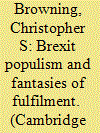

|
|
|
|
|
| Summary/Abstract |
For Leave voters the Brexit referendum of 23 June 2016 was invested with hopes and dreams, of refound sovereignty and control, freedom and liberty, subjectivity and agency. Brexit was an opportunity for both new beginnings and a reclamation of British essences. Winning, however, has not provided the closure promised, and today Leave supporters often appear decidedly anxious and angry. Bringing together literature on ontological security with Lacanian understandings of the (always incomplete) nature of subjectivity, this paper provides an explanation of how it is that ’Brexit’ became invested with such high hopes of fulfilment, but also why the populist ’fantasies’ underpinning Brexit have inevitably fallen short. However, while closure around ontological security and subjectivity is impossible, the paper shows how the promise of fulfilment (and its inevitable failure) can be politically seductive and mobilizing, is a central strategy of populist politics, but as such is also one that is only likely to exacerbate the ontological anxieties and insecurities upon which populist politics preys.
|
|
|
|
|
|
|
|
|
|
|
|
|
|
|
|
| 4 |
ID:
160618
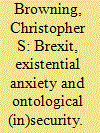

|
|
|
|
|
| Summary/Abstract |
This article explores how the Brexit Referendum on the UK's membership of the European Union has been a source of destabilisation, dread and ontological anxiety. Focusing mainly on British citizens who voted or self-identified as “Remainers”, and on EU foreign nationals resident in the UK, it shows how existential anxieties have had different points of focus for different groups of people. Confronted with such destabilising anxieties, the article shows how people have adopted different mechanisms designed to reassert a sense of order and certitude often viewed as central to preserving ontological security. The ways in which this has been done, however, can themselves raise important questions.
|
|
|
|
|
|
|
|
|
|
|
|
|
|
|
|
| 5 |
ID:
101008
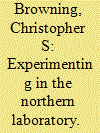

|
|
|
|
|
| Publication |
2010.
|
| Summary/Abstract |
This article explores the changing nature of security governance in Northern Europe since the end of the Cold War. Prior to enlargement in 2004 European Union (EU) involvement in the region was limited and cautious, with security governance driven predominantly by regional actors. At the same time, the connection between 'security' and projects of 'regional cooperation' was complex and largely interdependent. Since 2004 the EU has become more engaged in the region, most recently through its new Strategy for the Baltic Sea Region via which the north is conceptualised as a possible test case for broader conceptions of regional governance in Europe. The article argues that such developments raise significant questions, not only for the future and nature of regional security conceptions in the north, but also in respect of how the EU conceptualises itself in relation to security more generally.
|
|
|
|
|
|
|
|
|
|
|
|
|
|
|
|
| 6 |
ID:
083745
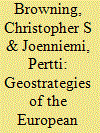

|
|
|
|
|
| Publication |
2008.
|
| Summary/Abstract |
The debate about the European Neighbourhood Policy (ENP) has, in essence, been about borders and bordering. Such departures could contribute - and often do so - to a rather fixed geopolitical vision of what the EU is about and how it aims to run and to organize the broader European space. However, this article aims to retain space for viewing the ENP as a developmental and somewhat fluid process. A conceptual framework, based on outlining three geopolitical models and a series of different geopolitical strategies employed by the EU in regard to its borders, is hence employed in order to be able to tell a more dynamic story regarding the developing nature of the ENP and the EU's evolving nature more generally. The complexity traced informs us that various geostrategies may be held at the same time at the external border. Moreover, the dominance of one geostrategy may be replaced by another or a different combination of them with regard to the same neighbourhood. It is, more generally, argued that if anything it is precisely this dynamism that should be championed as a valuable resource, avoiding the tendency to close off options through the reification of particular visions of the nature of the EU and its borders.
|
|
|
|
|
|
|
|
|
|
|
|
|
|
|
|
| 7 |
ID:
155448


|
|
|
|
|
| Summary/Abstract |
To date, (critical) geopolitics has had little to say about contemporary competitive identity practices of nation branding in global politics, while existing analyses of nation branding in other disciplines have tended to overlook its geopolitical dimensions. This expanded Introduction (and the special section as a whole) therefore seeks to explore some of the implications of nation branding for geopolitics, while simultaneously utilising the insights of critical geopolitics to shed light on nation branding practices. The Introduction makes the case for a broad conception of nation branding that challenges claims it is immutably linked to capitalist logics in an era of globalisation. It subsequently explores claims that nation branding is simply an updated form of nation building and that it is also an inherently benign and peace promoting activity. The Introduction ends by highlighting how, despite claims that the contemporary prevalence of nation branding practices is indicative of a categorical shift from a geopolitical to a geoeconomic world, nation branding practices frequently remain deeply infused with rather traditional geopolitical scripts.
|
|
|
|
|
|
|
|
|
|
|
|
|
|
|
|
| 8 |
ID:
137712
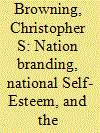

|
|
|
|
|
| Summary/Abstract |
Surprisingly, the emergent and increasingly popular phenomenon of nation branding has received only scant attention from International Relations scholars. While most analyses account for the phenomenon by emphasizing the perceived material benefits to be derived from establishing a positive national brand, this article provides an alternative perspective. It argues that nation-branding processes need to be understood as responding to the need of states and state leaders to enhance both their citizens and the nation's sense of ontological security and (self)-esteem. Moreover, this quest for self-esteem and ontological security is unfolding in the context of broader realignments occasioned by the advent of late modernity. While nation branding represents an understandable response to these developments, the article questions the strategy's overall efficacy by highlighting its implications for how national subjectivity is constituted, its notable disciplining elements and its potentially undemocratic implications.
|
|
|
|
|
|
|
|
|
|
|
|
|
|
|
|
| 9 |
ID:
151177
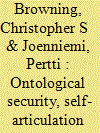

|
|
|
|
|
| Summary/Abstract |
The concept of ontological security has made increasing headway within International Relations, in particular through its ability to offer alternative explanations of the forces underpinning security dilemmas and conflict in world politics. While welcoming the insights already provided by its application, this article argues that the concept’s use to date has been too much geared to questions of identity-related stability, with change viewed as disturbing and anxiety-inducing. In contrast, the article calls for a more open understanding that: (i) links ontological security to reflexivity and avoids collapsing together the concepts of self, identity and ontological security; (ii) avoids privileging securitization over desecuritization as a means for generating ontological security; and (iii) opens out the concept beyond a narrow concern with questions of conflict and the conduct of violence more towards the theorization of positive change.
|
|
|
|
|
|
|
|
|
|
|
|
|
|
|
|
| 10 |
ID:
155465
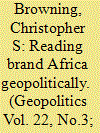

|
|
|
|
|
| Summary/Abstract |
In 2010, the ‘Brand Africa’ initiative was launched with the mission to transform perceptions of Africa from a continent of calamities into one of promising economic prospects and entrepreneurial populations. This transformation, ‘Brand Africa’ claims, is one where Africans take their representation from the hands of foreigners and make, through a new image, their own (hi)story. In this respect Brand Africa can be interpreted as a form of subaltern geopolitics seeking to subvert dominant geopolitical knowledge and to fight established structures of domination. However, the article argues its subversive elements are limited, especially when compared to the historical discourses of decolonial pan-Africanism upon which it draws for legitimacy. Indeed, while appropriating this legacy Brand Africa offers up a very different geopolitical vision of possible/desirable African futures. It is argued that this may be accounted for by understanding the extent to which the Brand Africa initiative appears embedded within a South African national context and its own geopolitical ambitions evident within its own nation branding project. What this highlights in turn is that the emancipatory potential and assumed synergies between national and supranational branding central to the Brand Africa initiative are not as unproblematic or uncontested as claimed.
|
|
|
|
|
|
|
|
|
|
|
|
|
|
|
|
| 11 |
ID:
054385
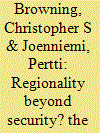

|
|
|
| 12 |
ID:
075685
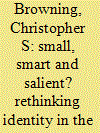

|
|
|
|
|
|
|
|